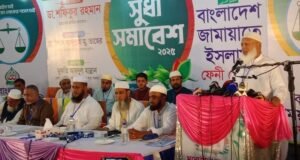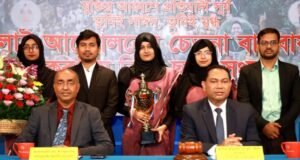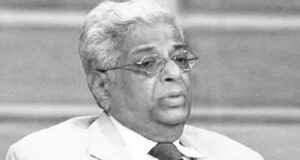
Bangla Mirror Desk:
The British High Commission, the British Council and the new Imperial College Alumni Association of Bangladesh came together to celebrate the UK’s excellence in Science and Medicine, Technology, Engineering and Mathematics, by arranging a reception at the British High Commissioner’s Residence..
The event was inaugurated by the British High Commissioner, HE Mr Robert Chatterton Dickson. He said the future and prosperity of the world, including the UK and Bangladesh, depends on scientific and technological excellence. Imperial College London is one of the world’s great scientific and technological powerhouses and he was delighted that so many scholars from Bangladesh have gained from and contributed to the institution over many years. He wished the new Alumni group every success in further developing the relationship between some of the best UK and Bangladeshi scientists.
This was followed by remarks made by the special guest of the event, the Senior Secretary of the Ministry of Science and Technology, Mr. Ziaul Hasan. The Senior Secretary shared that the Government of Bangladesh in this current regime acknowledges science and technology as crucial components for the country’s development, and has taken numerous initiatives to further its advancement. He then said that the event is a celebration that will create a strong network between the Imperial Alumni, British High Commission, British Council and the Government of Bangladesh, and he will extend his full cooperation to strengthen this relationship further. Remarks were also made by David Knox, Director Programmes Bangladesh, British Council, who encouraged the UK Alumni in Bangladesh to remain connected and gain inspiration from one another. He also mentioned that he is pleased to see the female representation in the field of STEM in this event, and shared news about fellowships and opportunities for students and early career researchers in Bangladesh.
The event was attended by the Imperial College alumni network, as well as some of the most highly regarded experts in the field of STEM in Bangladesh. Imperial College London, one the most prestigious academic institutes in the world routinely appearing in leading positions in global rankings of universities, has been attended by Bangladeshi students for many decades. Through this event the Imperial College Alumni Association of Bangladesh (ICAAB) was launched with the goal of working together on a mission to advance UK-Bangladesh collaborations in STEM in the future. To further advancements in this sector ICAAB has now entered into a collaboration with Imperial Consultants, whereby Bangladeshi entities shall now be able to access highly skilled technical experts from Imperial College UK through ICAAB’ remarked Dr. Anika Ali, President, ICAAB.
The event emphasized on unpacking ways in which UK’s excellence in science and medicine, technology, engineering, and mathematics can contribute to the many dimensions of social development and economic growth in Bangladesh. The highly esteemed panel of guest speakers at the event, spanning areas of epidemiology, genetics, climate, environment, satellite communication and renewable energy, included Dr. Senjuti Saha, Prof. Saleemul Huq, Dr. Colin Patra and Dipal Barua. Their key insight into the country’s current and future needs is invaluable for strengthening the relationship between the UK and Bangladesh, and for advancing cutting edge research in Science and Technology for the country’s rapid economic growth and sustainable development, in the face of climate change and pressing global challenges.
In his closing remarks Phillip Choudhury, Imperial College London alum and coordinator of the evening’s event, noted the global implications of each speaker’s outstanding scientific achievements. Phillip also reminded us of the fundamental social implications of our scientific and technological endeavours.
 Weekly Bangla Mirror | Bangla Mirror, Bangladeshi news in UK, bangla mirror news
Weekly Bangla Mirror | Bangla Mirror, Bangladeshi news in UK, bangla mirror news







